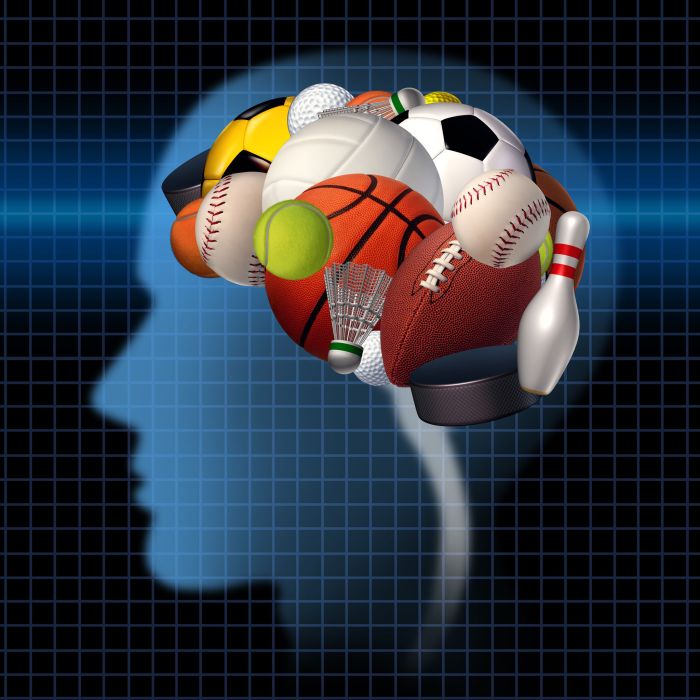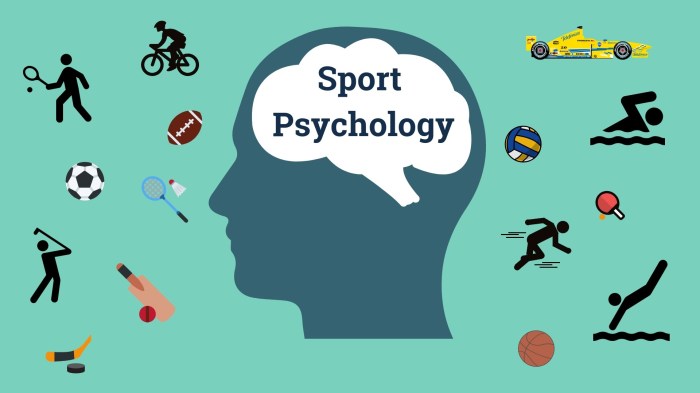Sports psychology delves into the mental aspects of athletic performance, offering insights into how our minds impact our physical abilities on the field or court. As we explore the role of mental toughness, visualization techniques, and goal setting, we uncover a world where the mind and body work in unison to achieve peak athletic success.
Overview of Sports Psychology

Sports psychology is the study of how psychological factors can affect an individual’s performance in sports and athletic activities. It involves applying psychological principles to improve motivation, concentration, confidence, and overall mental toughness in athletes.
Importance of Sports Psychology in Enhancing Athletic Performance
Sports psychology plays a crucial role in enhancing athletic performance by helping athletes develop the right mindset and mental skills needed to excel in their sport. By working with sports psychologists, athletes can learn how to manage stress, overcome performance anxiety, set effective goals, and maintain focus during competitions.
- Improving Confidence: Sports psychology helps athletes build confidence in their abilities and performance, leading to better outcomes on the field or court.
- Enhancing Focus: Athletes can learn techniques to improve concentration and stay focused on the task at hand, even under pressure.
- Managing Pressure: Sports psychology equips athletes with strategies to handle the stress and pressure of high-stakes competitions, allowing them to perform at their best when it matters most.
Real-life Applications of Sports Psychology in Professional Sports
Sports psychology is widely used in professional sports to give athletes a mental edge over their competitors. Many professional teams and individual athletes work with sports psychologists to optimize their performance and mental well-being.
- Visualization Techniques: Athletes use visualization to mentally rehearse their performance and visualize success, enhancing their confidence and performance on game day.
- Goal Setting: Setting specific, measurable, achievable, relevant, and time-bound (SMART) goals helps athletes stay motivated and focused on continuous improvement.
- Stress Management: Athletes learn stress management techniques to cope with the demands of their sport and maintain a healthy balance between their athletic and personal lives.
Key Concepts in Sports Psychology

In the field of sports psychology, there are several key concepts that play a crucial role in enhancing athletes’ performance and mental well-being.
Mental Toughness in Sports Psychology
Mental toughness is a vital concept in sports psychology, referring to the ability of athletes to maintain focus, confidence, and determination in the face of adversity. Athletes with high levels of mental toughness are better equipped to handle pressure situations, bounce back from setbacks, and stay motivated during challenging times. This mental resilience allows athletes to perform at their best, even under stressful conditions.
Impact of Visualization Techniques on Athletes’ Performance
Visualization techniques involve mentally rehearsing and imagining successful performance scenarios in detail. Athletes use visualization to enhance their skills, build confidence, and reduce anxiety. By visualizing themselves executing perfect techniques and achieving their goals, athletes can improve their overall performance. Visualization also helps athletes create a positive mindset and develop a strong belief in their abilities.
Significance of Goal Setting in Sports Psychology
Goal setting is a fundamental aspect of sports psychology that helps athletes focus on specific objectives and work towards achieving them. By setting clear, measurable, and realistic goals, athletes can enhance their motivation, track their progress, and stay committed to their training. Goal setting also allows athletes to prioritize their efforts, stay organized, and maintain a sense of direction in their athletic pursuits.
Psychological Skills Training
Psychological skills training is a crucial aspect of sports psychology that focuses on developing mental strategies to improve athletic performance.
Different Psychological Skills Training Methods
- Imagery: Athletes use visualization techniques to mentally rehearse their performance, creating a mental image of themselves executing skills perfectly.
- Self-talk: Positive self-talk involves using affirmations and encouraging statements to boost confidence and focus during training and competition.
- Goal setting: Setting specific, measurable, achievable, relevant, and time-bound goals helps athletes stay motivated and track their progress.
- Relaxation techniques: Deep breathing, progressive muscle relaxation, and mindfulness can help athletes manage stress and anxiety.
Effectiveness of Imagery and Self-Talk
Imagery and self-talk are both powerful tools in enhancing athletic performance, but they work in different ways.
- Imagery helps athletes mentally prepare for competition by creating a detailed mental image of success, improving confidence and focus.
- Self-talk, on the other hand, can help athletes stay motivated, manage negative thoughts, and maintain a positive mindset during challenging situations.
Developing Resilience through Psychological Skills Training
Psychological skills training can help athletes develop resilience, the ability to bounce back from setbacks and adversity.
- By practicing visualization and positive self-talk, athletes can build mental toughness and cope with pressure effectively.
- Setting realistic goals and learning to control their emotions can also enhance an athlete’s resilience in the face of challenges.
The Relationship Between Mind and Body in Sports
In sports, the connection between the mind and body plays a crucial role in determining an athlete’s performance. Mental strategies can have a significant impact on physical abilities, leading to improved overall outcomes in various sports disciplines.
The Concept of Flow State
The flow state, also known as being “in the zone,” refers to a mental state where an athlete is fully immersed in the activity, feeling energized, focused, and completely absorbed in the present moment. This state of optimal experience allows athletes to perform at their best, with heightened concentration and a sense of effortless action.
- Flow state is characterized by a perfect balance between the challenge of the task and the athlete’s skill level, leading to a state of peak performance.
- Athletes in the flow state often report feeling a sense of timelessness, where hours can feel like minutes, indicating a complete absorption in the activity.
- Being in the flow state can enhance motivation, creativity, and overall enjoyment of the sport, making it a desirable state for athletes to achieve during competitions.
Stress Management and Physical Well-Being in Sports
Effective stress management is essential for athletes to maintain physical well-being and overall performance. Stress can manifest in both mental and physical symptoms, impacting an athlete’s ability to perform at their best.
- Chronic stress can lead to fatigue, muscle tension, decreased coordination, and increased risk of injury, affecting an athlete’s physical capabilities.
- Implementing stress management techniques such as deep breathing, visualization, and mindfulness can help athletes alleviate stress and improve their physical performance.
- By learning to control stress levels, athletes can enhance their recovery process, boost immune function, and maintain overall physical health, contributing to better performance outcomes in sports.